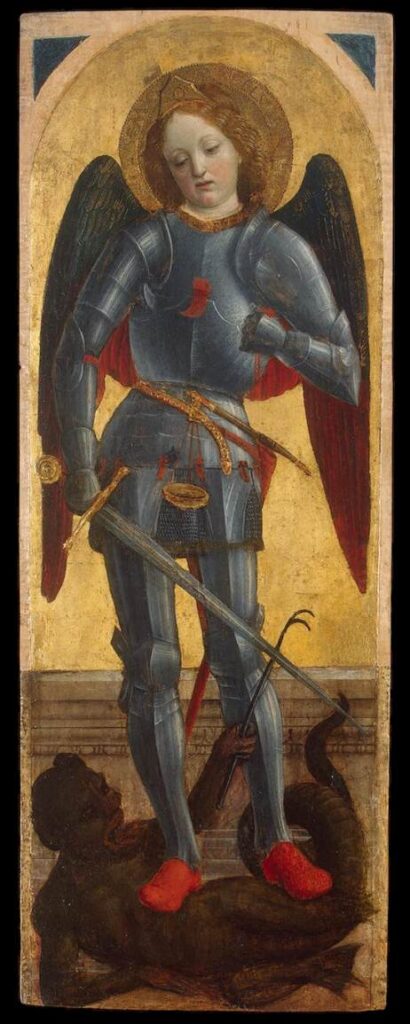Prior to the 1970 revision of the liturgical calendar, September 29 was the exclusive preserve of the Archangel Michael. In one of the more intelligent calendar revisions, Michael has been joined to the only other two archangels named in the Bible.
In the Low Mass of the Extraordinary Form, the Leonine Prayers include the petition to St. Michael the Archangel to “defend us in battle” and “to be our safeguard against the wiles and snares of the Devil.” In recent years, that prayer has been returned to usage in many dioceses – although Cardinal Cupich of Chicago has actually forbidden praying it – before, during, or after Mass. One wonders why.
St. Michael is the great defender of the honor of God and the protector of the Church’s faithful, who find themselves under the assault of the Evil One in so many ways. Some assaults come from without, by the hands of those who hate God and His Church. Our co-religionists suffer in Communist China, many countries of the Middle East and Africa, but also from militant secularists in Western Europe and North America – yes, even in our own country. The aggression began during the Obama Administration, had a brief respite in the Trump years, and now continues and has escalated under the pious Catholic, Joe Biden.
Then there are the assaults that come from within the Church by those Hell-bent (literally) on creating a new Church and a new religion. These would-be reformers preach and teach overt heresy and destroy the sense of the sacred by their liturgical machinations, often done with the complicity of priests and bishops who are weak and ineffectual. Yes, Satan uses our weakness to pursue his plan with strength.
To ward off the assaults of Satan – both internal and external – we need to have recourse to the powerful intercession of St. Michael the Archangel, who faced down Lucifer and his minions at the dawn of Creation and has not lost any of his power. Indeed, the Book of Revelation informs us that he will be the one to lead the faithful to final victory.
And now for a bit of refresher course in “angelology” – to which the Catechism of the Catholic Church devotes a full twenty-five paragraphs.

Angels are pure spirits who assume bodily form when sent on a mission by the Almighty. Their very name in Greek means “messenger.” So we relate to them not in terms of their own identity, but for the One they represent. Both the Old and New Testaments are filled with references to the interventions of angels, which are always seen as signs of God’s desire to be present to us, as well as the revelation of His will and constant providence.
The names of the three archangels of this day give a clue as to their special mission.
In Hebrew, Michael’s name means: “Who is like God?” – a reminder that he was sent to do battle with the personification of pride in Lucifer, who indeed saw himself as like unto God.
“Gabriel” means “God is strong” – an important point to ponder when, like the Blessed Virgin at the Annunciation, we ask how something apparently impossible can happen.
Raphael’s name tells us that “God heals” – a fact obvious to a person of faith, yet we often fail to be properly impressed by the love that represents.
Thus, the names of those three angels point to the ineffable omnipotence and benevolence of the very Godhead.
What is the work of angels? To watch over the lives of us here below; to present our prayers and petitions to God; to serve as the Lord’s special messengers; to lead the just into Paradise, as we sing in the beautiful In Paradisum of the Mass of Christian Burial. All of this bespeaks the Lord’s love and concern for His children.
The first and most important task of the angels, however, gives us a hint of what God expects of us, too – the angels’ unceasing adoration of Almighty God.
So, the most important thing the angels do is linked to the most important thing the Church on earth can do: the liturgy here and now is united to the liturgy of Heaven. As we enter into the Eucharistic Prayer, we recall this fact when we say: “And so, with Angels and Archangels, with Thrones and Dominions, and with all hosts and Powers of heaven, we sing the hymn of your glory, as without end we acclaim: Holy, Holy, Holy Lord God of hosts.”
Particularly moving are the words of the Byzantine Liturgy used at this same point: “Let us who mystically represent the Cherubim and sing the thrice-holy hymn to the life-creating Trinity, set aside all earthly cares, that we may welcome the King of all, invisibly escorted by angelic hosts. Alleluia, alleluia, alleluia.”
That everlasting hymn of praise to God is the angels’ highest calling, and it’s ours as well.
Further into the Roman Canon, we ask the Father: Iube haec perferri per manus sancti Angeli tui in sublime altare tuum, in conspectu divinae maiestatis tuae (“Command that these gifts be borne by the hands of your holy angel to your altar on high in the sight of your divine majesty”). The Incarnation announced by Gabriel reaches its fulfillment in the mystery of the Holy Eucharist as God’s messenger becomes the deacon, as it were, who presents the Eucharistic Christ once more to His heavenly Father.
On this feast when the Church invites us to reflect on the ministry of angels, we thank Almighty God for giving us His messengers. And we ask for the wisdom and the humility of children to appreciate anew their significance for our lives because, after all is said and done, if you have “outgrown” the angels, you may also have outgrown God – a point made by Our Lord Himself in today’s Gospel.
__________















